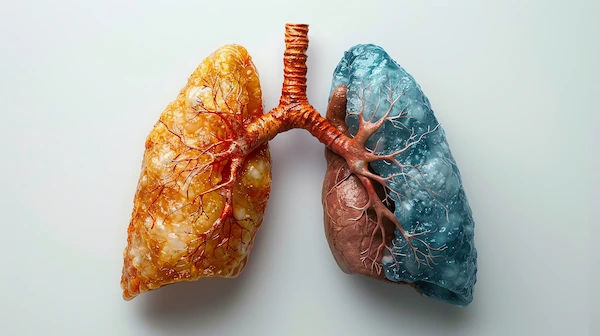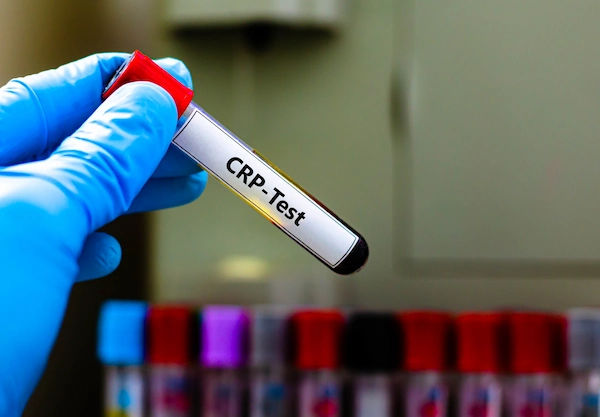Infections Linked to High CRP Levels
Discover how infections can be detected with CRP in blood and now the symptoms. learn how to manage infections and reduce inflammation.

Written by Dr. M L Ezhilarasan
Reviewed by Dr. D Bhanu Prakash MBBS, AFIH, Advanced certificate in critical care medicine, Fellowship in critical care medicine
Last updated on 20th Aug, 2025
.webp?tr=q-80,f-webp,w-350,dpr-2,c-at_max 700w)
When you visit a doctor with an infection or inflammation, they may order a C-reactive protein (CRP) test. It is a simple blood test that helps determine how much inflammation is present in your body. High CRP levels often indicate an infection or another inflammatory condition.
In this article, we’ll explore:
- What CRP is and why it matter?
- Common infections linked to high CRP
- Symptoms to watch for
- How to manage infections and reduce inflammation?
- When to seek medical help?
What is CRP?
CRP is a substance produced by your liver in response to inflammation. When your body fights an infection, injury, or disease, CRP levels rise.
Doctors use this test to:
- Detect bacterial or viral infections
- Monitor chronic inflammatory conditions like arthritis
- Assess recovery after surgery or treatment
A normal CRP level is usually below 10 mg/L. Higher levels suggest an active infection or inflammation.
Common Infections Linked to High CRP
High CRP levels often point to infections such as:
1. Bacterial Infections
- Pneumonia lung infection
- Urinary Tract Infections
- Sepsis- a severe, life-threatening infection
- Skin infections like cellulitis, abscesses
2. Viral Infections
- Influenza
- COVID-19
- Hepatitis
3. Fungal or Parasitic Infections
- Tuberculosis (TB)
- Malaria
CRP levels are usually much higher in bacterial infections compared to viral ones. Doctors may use this to decide whether antibiotics are needed.
Visit the physician for urgent medical care
Symptoms of Infections with High CRP
If you have an infection, you may experience:
- Fever or chills
- Fatigue and weakness
- Pain or swelling in affected areas
- Lung infections with cough, shortness of breath
- Frequent urination, burning sensation in UTIs
- Skin infections with redness, warmth, or pus
If symptoms persist or worsen, consult a doctor immediately.
How to Manage Infections and Lower CRP Levels?
Infections can be managed by medicines, boosting immunity and adopting natural ways, few of them are mentioned below
1. Follow Medical Treatment
- Antibiotics for bacterial infections
- Antivirals or antifungals if prescribed
- Pain relievers like paracetamol for fever
2. Boost Your Immune System
- Stay hydrated
Drink plenty of water and fluids. - Eat a balanced diet
Include fruits, vegetables, and protein. - Get enough rest
Sleep helps your body recover.
3. Reduce Inflammation Naturally
- Turmeric & Ginger
Have anti-inflammatory properties. - Omega-3 fatty acids
found in fish, and flaxseeds Help lower CRP. - Avoid processed foods & sugar
As these can worsen inflammation.
4. Monitor Your Health
- If you have a chronic condition (like diabetes), keep it under control.
- Regular check-ups can help detect infections early.
When to See a Doctor?
Seek medical attention if you have:
- Persistent high fever
- Severe pain or swelling
- Difficulty breathing
- Confusion or extreme fatigue
If your CRP test shows very high levels (above 100 mg/L), it could indicate a serious infection like sepsis, requiring urgent care.
How Apollo 24|7 Can Help?
If you suspect an infection or have been advised to check your CRP levels, you can:
Book a CRP test easily from home.
Consult a doctor online for quick advice.
Get prescribed medications delivered to your doorstep.
Early detection and treatment can prevent complications. Don’t ignore persistent symptoms—get help when needed.
Final Thoughts
High CRP levels are a sign that your body is fighting an infection or inflammation. While mild cases can improve with rest and home care, severe infections need medical attention. Eating well, staying hydrated, and following your doctor’s advice can help you recover faster.
Visit the physician for urgent medical care
Visit the physician for urgent medical care

Dr. Rohinipriyanka Reddy
General Practitioner
9 Years • MBBS
Hyderabad
Apollo 24|7 Clinic, Hyderabad

Dr. Jawwad Mohammed Kaleem
General Practitioner
4 Years • MBBS
Hyderabad
Apollo 24|7 Clinic, Hyderabad

Dr. Mohammed Kamran
General Practitioner
5 Years • MBBS, FIDM
Nashik
Apollo 24|7 Clinic - Maharashtra, Nashik

Dr. Vasanthasree Nair
General Practitioner
15 Years • MBBS
Angamaly
Apollo 24|7 Clinic - Kerala, Angamaly
(525+ Patients)

Dr. Shaik Abdul Kalam
General Practitioner
3 Years • MD (Physician)
Visakhapatnam
Apollo 24|7 Clinic - Andhra Pradesh, Visakhapatnam
(175+ Patients)
Visit the physician for urgent medical care

Dr. Rohinipriyanka Reddy
General Practitioner
9 Years • MBBS
Hyderabad
Apollo 24|7 Clinic, Hyderabad

Dr. Jawwad Mohammed Kaleem
General Practitioner
4 Years • MBBS
Hyderabad
Apollo 24|7 Clinic, Hyderabad

Dr. Mohammed Kamran
General Practitioner
5 Years • MBBS, FIDM
Nashik
Apollo 24|7 Clinic - Maharashtra, Nashik

Dr. Vasanthasree Nair
General Practitioner
15 Years • MBBS
Angamaly
Apollo 24|7 Clinic - Kerala, Angamaly
(525+ Patients)

Dr. Shaik Abdul Kalam
General Practitioner
3 Years • MD (Physician)
Visakhapatnam
Apollo 24|7 Clinic - Andhra Pradesh, Visakhapatnam
(175+ Patients)
_0.webp)



.webp)